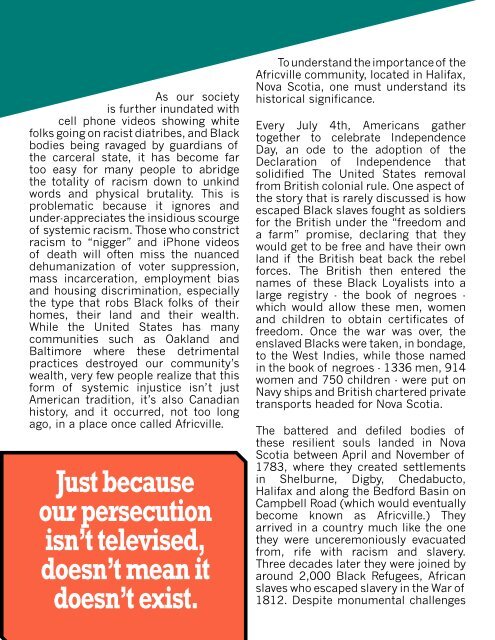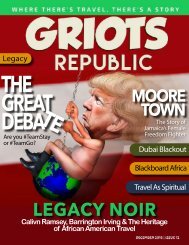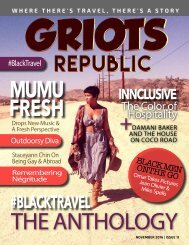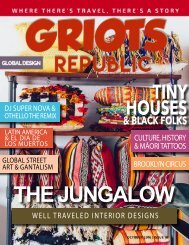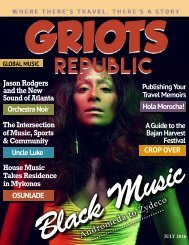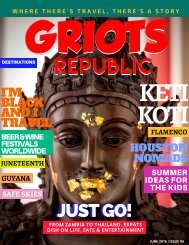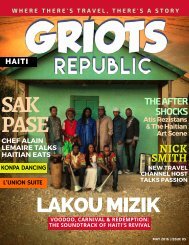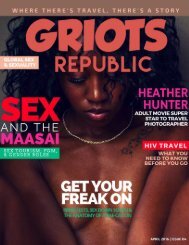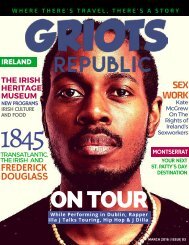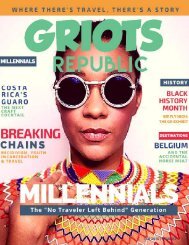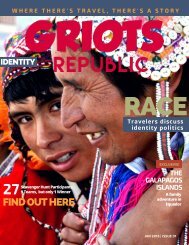GRIOTS REPUBLIC - AN URBAN BLACK TRAVEL MAG - AUGUST 2016
O Canada! Our August issue is a destination issue on Canada. Check out profiles from The Passport Party Project, Olympian Aaron Kingsley Brown, Oneika The Traveller and My Wander Year. This issue also includes a Black Lives Matter Special Section.
O Canada! Our August issue is a destination issue on Canada. Check out profiles from The Passport Party Project, Olympian Aaron Kingsley Brown, Oneika The Traveller and My Wander Year.
This issue also includes a Black Lives Matter Special Section.
You also want an ePaper? Increase the reach of your titles
YUMPU automatically turns print PDFs into web optimized ePapers that Google loves.
As our society<br />
is further inundated with<br />
cell phone videos showing white<br />
folks going on racist diatribes, and Black<br />
bodies being ravaged by guardians of<br />
the carceral state, it has become far<br />
too easy for many people to abridge<br />
the totality of racism down to unkind<br />
words and physical brutality. This is<br />
problematic because it ignores and<br />
under-appreciates the insidious scourge<br />
of systemic racism. Those who constrict<br />
racism to “nigger” and iPhone videos<br />
of death will often miss the nuanced<br />
dehumanization of voter suppression,<br />
mass incarceration, employment bias<br />
and housing discrimination, especially<br />
the type that robs Black folks of their<br />
homes, their land and their wealth.<br />
While the United States has many<br />
communities such as Oakland and<br />
Baltimore where these detrimental<br />
practices destroyed our community’s<br />
wealth, very few people realize that this<br />
form of systemic injustice isn’t just<br />
American tradition, it’s also Canadian<br />
history, and it occurred, not too long<br />
ago, in a place once called Africville.<br />
Just because<br />
our persecution<br />
isn’t televised,<br />
doesn’t mean it<br />
doesn’t exist.<br />
To understand the importance of the<br />
Africville community, located in Halifax,<br />
Nova Scotia, one must understand its<br />
historical significance.<br />
Every July 4th, Americans gather<br />
together to celebrate Independence<br />
Day, an ode to the adoption of the<br />
Declaration of Independence that<br />
solidified The United States removal<br />
from British colonial rule. One aspect of<br />
the story that is rarely discussed is how<br />
escaped Black slaves fought as soldiers<br />
for the British under the “freedom and<br />
a farm” promise, declaring that they<br />
would get to be free and have their own<br />
land if the British beat back the rebel<br />
forces. The British then entered the<br />
names of these Black Loyalists into a<br />
large registry - the book of negroes -<br />
which would allow these men, women<br />
and children to obtain certificates of<br />
freedom. Once the war was over, the<br />
enslaved Blacks were taken, in bondage,<br />
to the West Indies, while those named<br />
in the book of negroes - 1336 men, 914<br />
women and 750 children - were put on<br />
Navy ships and British chartered private<br />
transports headed for Nova Scotia.<br />
The battered and defiled bodies of<br />
these resilient souls landed in Nova<br />
Scotia between April and November of<br />
1783, where they created settlements<br />
in Shelburne, Digby, Chedabucto,<br />
Halifax and along the Bedford Basin on<br />
Campbell Road (which would eventually<br />
become known as Africville.) They<br />
arrived in a country much like the one<br />
they were unceremoniously evacuated<br />
from, rife with racism and slavery.<br />
Three decades later they were joined by<br />
around 2,000 Black Refugees, African<br />
slaves who escaped slavery in the War of<br />
1812. Despite monumental challenges


